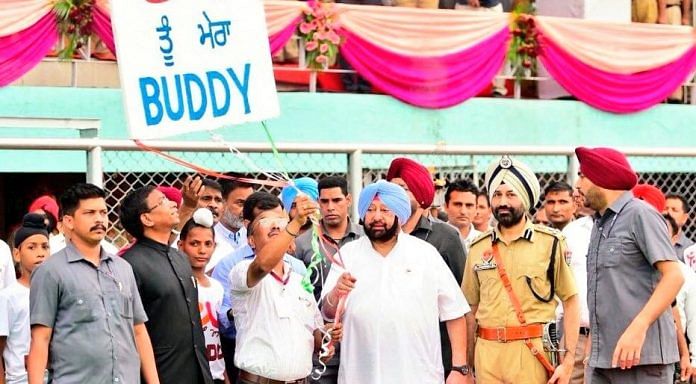The project will involve all students from schools (class VI and above), colleges and universities. Groups will be formed for the students to self-monitor.
Chandigarh: In a bid to combat the drug menace in the state, as depicted in the Bollywood film Udta Punjab, Captain Amarinder Singh’s government has launched the country’s biggest addiction prevention programme.
Titled ‘Tu mera buddy’, the programme is targeted at students in schools, colleges, universities and technical institutions, and aims to penetrate every classroom from class VI upwards. Groups of five or less children will be created to self-monitor and generate awareness.
India's 72nd #IndependenceDay celebrations in Ludhiana saw the inauguration of STF's #TuMeraBuddy program- the first of its kind campaign involving students to combat drug abuse, by Hon'ble CM @capt_amarinder Ji. Sharing a few glimpses of the same.#DrugFreePunjab#SayNoToDrugs pic.twitter.com/DWxp6i106B
— STF Punjab (@STFPunjab) August 20, 2018
“Once it’s fully on course, it will be the country’s largest self-monitoring drug abuse prevention programme. The idea is to reach out to the youngest level possible and inculcate a spirit of healthy living,” said additional director general of police Harpreet Singh Sidhu, who heads the special task force on drug prevention.
In his Independence Day speech in Ludhiana, the chief minister said the state wanted freedom from this sick habit. He warned that those involved in exploiting and ruining the youth would not be spared at any cost.
Nearly 20,000 cases have been registered under the Narcotics, Drugs and Psychotropic Substances Act, involving about 22,000 drug peddlers and distributors. The state is working to ensure forfeiture of illegally acquired property of drug traders, and to secure death penalty for them, Amarinder said.
Also read: How an Akali govt order on dope tests never saw the light of day in Punjab
Process to be followed
The project will involve principals, teachers, all students and their parents. The buddy project will be led by class teachers and will be supervised by the principals and district education officers.
“The programme is a result of some important things we have learnt along the way. One was that curtailing the supply of drugs alone cannot help tackle the situation completely. Reduction of demand was essential for success,” said ADGP Sidhu.
“Students in teen years or early 20s were most vulnerable to experiment with or use drugs or intoxicants. The solution was to counter this through positive peer pressure and build barriers to drug use at early stage.”
The young guns have made an instant affiliation with #TuMeraBuddy! The zeal, the purposeful expressions say all about their commitment towards Punjab's prosperous and drug free future!#SayNoToDrugs#DrugFreePunjab pic.twitter.com/2PdNYMPjra
— STF Punjab (@STFPunjab) August 15, 2018
The programme is well underway, with the training of master trainers almost complete. These master trainers will then train school and college teachers. At least one teacher will be trained to be the ‘senior buddy’.
The entire classroom will be divided into buddy groups. Five classmates of the same section will be chosen to be the buddies. These will include a balanced mix taking into account their temperament, academic performance etc. Each buddy group will be asked to watch one another for early signs of drug addiction, or even other students susceptible to it.
“Apart from it being a one-way process between a buddy group and the rest of the class, we have introduced the concept of role playing. That will help develop social skills to refuse drugs and will have a long term impact on the mind,” added Sidhu.
What student buddies will be trained to know
- What are drugs and their effects?
- How to say ‘no’ to drugs?
- How to recognise the signs of drug use in your buddy?
- What to do about it?Help, share, care, trust, partner.
What teachers will be trained to do
- Discuss harmful effects of drugs.
- Supervise buddy group.
- Provide solutions.
- Not make it a negative/scare campaign.
- Make the communication positive.
- Praise the activities of individuals who don’t use drugs/intoxicants.
Also read: Khattar objects to high court collegium’s Punjab picks, and Amarinder is not pleased



